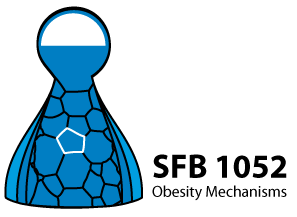Curriculum 2018
| 02. - 03.03. | I CRC-retreat in Nimbschen |
| 16.05. - 17.05. | IRTG module: GALAXY platform |
| 07.05.- 28.06. | IRTG module: Anatomy course |
| 30.05. | 1. Doc´s breakfast |
| 14.06.-15.06. | IRTG module: Principles of clinical studies |
| 22.06. | Long night of science |
| 20.08. - 21.08. | IRTG skilling course: Scientific writing |
| 18.09./10.10./17.10. | IRTG module: Proteinexpression-, purification und characterisation |
| 08. - 09.10. | Gender equality symposium (cooperation with MPI-EVA) |
| 29. - 30.10. | IRTG module: Therapeutic targeting obesity |
| 05. - 07.11. | Autumn school in Neudietendorf |
| 30.11. | II CRC retreat in Leipzig |
Galaxy is a web-based analysis platform, aiming to make computational biology accessible to research scientists that do not have computational programming background.
The core values of Galaxy are:
- Accessibility
Users without programming experience can easily upload/retrieve date, run complex tools and workflows, and visualize data.
- Reproducibility
Galaxy captures information so that everyone can understand and repeat a complete computational analysis.
- Transparency
Users can share or publish their analyses (histories,workflows, visualizations).
During the hand-on seminar we will learn how to use Galaxy to simplify our computational analyses task.
We will first learn the basic handling, i.e. get familiar with the GALAXY history, learn how to load data, (e.g directly from the UCSC Table Browser), how to use different tools and how to visualize our data within GALAXY.
We will then use GALAXY to do transcriptome analyses and generate a workflow to reuse our analysis strategy to repeat the analzsis for another dataset.
In addition we will learn how to share data, histories, and workflows with other CRC members.
Terms and conditions
The seminar takes place on Wed.16.05 to Thurs.17.05 from 9.30am to 5.30pm (one hour lunch break) in room 109 at Härtelstraße 16-18.
A laptop with internet access is needed. There is eduroam in the room. If you do not have a laptop or eduroam access, please indicate this when registering. Both can be provided.
If you have any data, which you want to analyzes in the seminar, or special requests (for example, RNA-seq, Variant Calling, ChIP-Seq , or also metagenomics) you are welcome to contact Stephanie Kehr steffi@bioinf.uni-leipzig.de
Stephanie Kehr
steffi@bioinf.uni-leipzig.de
Schedule
|
Date |
Lecturer |
Lecture |
|
7. Mai 2018 |
||
|
8:15-9:45 Uhr |
Marco Koch |
Endokrine Organe |
|
14. Mai 2018 |
||
|
8:15-9:45 Uhr |
Marco Koch |
Kopf |
|
23. Mai 2018 |
||
|
8:15-9:45 Uhr |
Marco Koch |
ZNS I |
|
28. Mai 2018 |
||
|
8:15-9:45 Uhr |
Julia Landmann |
ZNS II |
|
4. Juni 2018 |
||
|
8:15-9:45 Uhr |
Marcin Nowicki |
ZNS III |
|
11. Juni 2018 |
||
|
8:15-9:45 Uhr |
Peter Wieghofer |
Lymphatische Organe I |
|
18. Juni 2018 |
||
|
8:15-9:45 Uhr |
Peter Wieghofer |
Lymphatische Organe II |
|
Date |
Lecturer |
Practical Part |
|
28. Juni 2018 13-17 Uhr |
Dr. Gericke |
Präparierkurs am Situs |
|
28. Juni 2018 13-17 Uhr |
Prof. Ingo Bechmann |
Präparierkurs am Gehirn |
Workshop Description
The two-day workshop Scientific Writing and Publishing covers the basics of scientific writing and publishing. Writing a successful research paper requires basic
knowhow, content knowledge, writing proficiency, strong research skills, creativity, organizational ability, patience, and confidence. This course will provide students with the background and skills necessary to develop and submit a clear, concise, and effective scientific manuscript. PhD students will learn how to write a scientific paper start to finish and how to deal with the publishing process. Participants should bring a laptop computer with any operating system for writing exercises. Copies of checklist, list of useful phrases, and various sample abstracts will be provided.
9:30 – 11:00 am (90 min)
WARM-UP
WHY DO WE WRITE – Introduction and Overview
WRITING WITH STYLE – Features of Effective Scientific Writing
Word choice, Sentences, Paragraphs, Flow of text
Writing exercises
11:00 – 11:15 am (15 min) break
11:15 – 12:45 pm (90 min)
BE PREPARED – Nuts and Bolts of Writing a Scientific Manuscript
Planing a paper: Key idea, Motivation, Collecting material, Scientific criteria, Timing
Exercise: Creating a mind map
PUTTING THINGS TOGETHER – Components of a Scientific Manuscript
Title, Abstract, Key Words, Introduction, Methods, Results, Discussion and Conclusions,
References (Citation) / IMRaD
Exercise: Creating an outline
12:45 – 1:30 pm (45 min) lunch break
1:30 – 3:00 pm (90 min)
TAKE THE LEAD – Powerful Titles and Compelling Abstracts
Key elements, What makes good title and abstract, Things to avoid, Tips for writing titles and
abstracts
PROS and CONS – Discussion of sample abstracts
3:00 – 3:15 pm (15 min) break
3:15 – 5:00 pm (90 min + 15 min)
WRITING STEPS
Exercise: Writing an abstract
DISCUSSION AND REVIEW
Day 2
9:30 – 11:00 am (90 min)
SUBMISSION PROCESS
Choosing a journal, Requirement and time frame of a submission, Submitting your paper
11:00 – 11:15 am (15 min) break
11:15 – 1:00 pm (90 min + 15 min)
DEALING WITH REVIEWS
Editorial processes, Peer review, Getting accepted
Exercise: Reviewing a paper
CLOSING COMMENTS AND REVIEW
Monday 8th and Tuesday 9th October 2018, MPI-EVA, Leipzig
Goal of the symposium The push for gender equality is one of the biggest social movements occurring today. In recent years we have seen this issue spread like wildfire through every realm of public life from politics to the entertainment industry. The scientific world forms a central part of this debate. We want to bring an open discussion about this movement and its ramifications for the scientific and academic community into our institute.
Schedule CRC 1052 Autumn school November 05–07, 2018 in Neudietendorf

